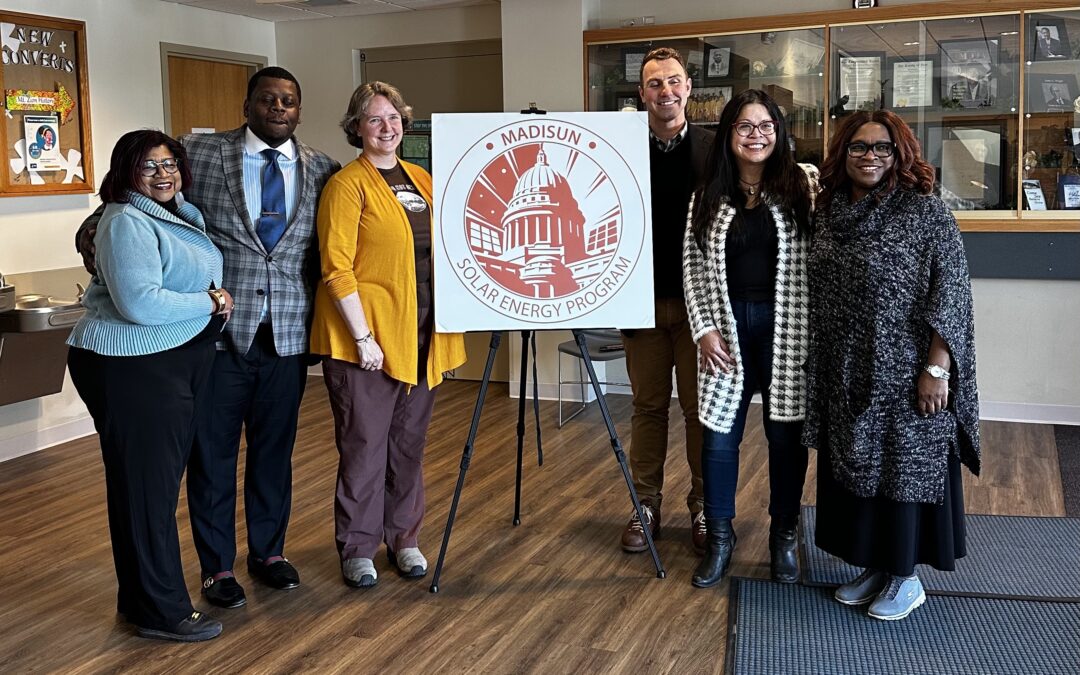On Tuesday, Madison Mayor Satya Rhodes-Conway and RENEW Wisconsin announced the launch of MadiSUN’s 2023 Solar Programs, the City’s initiative to expand solar energy for local homes, businesses, affordable housing providers, and nonprofits. Participants included Sam Dunaiski, Executive Director of RENEW Wisconsin; Rev. Dr. Marcus Allen Sr., Pastor of Mt. Zion Baptist Church; and Maria Redmond, Director of the Wisconsin Office of Sustainability and Clean Energy.
MadiSUN is the City of Madison’s initiative to help foster the expansion of solar renewable energy. It consists of three programs: Group Buy for Homes, Solar for Businesses, and the Backyard Solar Grant. The Group Buy for Homes program simplifies the process of going solar for Dane County homeowners by putting them into direct contact with reputable solar installers. Since 2016, it has helped 289 Dane County residents install solar panels, totaling over 1600 kW. Solar for Business aims to educate and encourage Madison-based businesses to install solar power at their facilities. Since the program’s inception in 2018, they have awarded grants to 24 businesses with an aggregate capacity of 1600-kW and a total investment of $2,200,435. The Backyard Solar Grant fosters access to solar power for Madison-based community organizations and affordable housing providers that serve City of Madison residents. 19 organizations have received grants from the Backyard Program, with Mt. Zion Baptist Church receiving a $10,000 grant in 2021 for their 21.6-kW solar array. Looking forward to the 2023 season, MadiSUN is optimistic about the new possibilities presented by the Inflation Reduction Act on the programs. With nonprofit organizations now able to utilize previously unavailable solar incentives and an increase in the Solar Investment Tax Credit, RENEW is excited to facilitate the continued growth of these programs.
“I anticipate 2023 will be our best year yet!” said Sam Dunaiski, Executive Director of RENEW Wisconsin, “As administrator of the MadiSUN programs, RENEW believes in an all-of-the-above approach to renewable energy adoption. MadiSUN helps community organizations lower the upfront costs of solar, it helps Madison businesses navigate the questions around commercial solar implementation, and it makes going solar easy and affordable for local homeowners. These solar projects will help residents throughout the Madison area save money on their utility bills and reduce their carbon footprint.”
“We felt that installing a solar system would help the church serve the South Madison community by providing an example of leadership in demonstrating to the minority community the importance of good environmental stewardship.” said Pastor Allen of Mt. Zion Baptist Church. “We want to show the community the potential of long-term benefits of reducing dependence on nonrenewable resources thus, reducing the church’s carbon footprint.”
Federal investments from the Inflation Reduction Act (IRA) will complement and accelerate Madison’s Climate Forward Agenda by providing much-needed funding to reduce greenhouse gas emissions from the building and transportation sectors. IRA incentives will help increase the reach of City programs that support energy efficiency upgrades to naturally occurring affordable housing, and rooftop solar for homes and businesses through MadiSUN, and accelerate the transition of the City’s fleet to low- and no-carbon fuels, among other ongoing initiatives. The timing is fortuitous for new programs as well. The City’s new Building Energy Savings Program will help large commercial building owners identify opportunities to increase their energy efficiency and save money.
“I am very excited about the opportunities President Biden’s Inflation Reduction Act will bring for our MadiSUN program. The bill will allow thousands of Madisonians to transition to clean energy and grow the energy efficiency of their homes and businesses,” said Mayor Satya Rhodes-Conway.
The IRA will help Madison accelerate and reach its climate goals by providing funding directly to local households, businesses, and nonprofits to reduce energy costs and make clean energy and transportation more accessible for everyone. This can be done through: home energy efficiency upgrades, home energy systems, using electric vehicles, growing Wisconsin’s green economy, and by businesses utilizing energy cost savings.
- Home energy efficiency upgrades – The law includes rebates for energy-efficient electric heat pumps, water heaters, stoves, ovens, or other home appliances with more energy-efficient electric appliances for low- and moderate-income households. Any household can receive tax credits covering 30% of the cost of home construction projects on windows, doors, insulation, or other weatherization measures that reduce energy waste. These upgrades can lower home energy bills by at least $350 annually.
- Home energy systems – Households can also receive tax credits to cover 30% of installation of solar panels or battery storage costs. The average family installing solar using this credit would save $9,000 on their electricity bill over the system’s life, or about $300 per year.
- Electric vehicles – The IRA makes electric vehicles more affordable by providing up-front discounts of up to $7,500 for new and $4,000 for used electric vehicles, helping families save as much as $950 per year on fuel costs. Businesses can receive tax credits of up to $40,000 for commercial electric vehicles and a $100,000 tax credit for installing EV charging infrastructure in qualified census tracts.
- Growing Wisconsin’s green economy – Between 2023 and 2030, the IRA will bring an estimated $4 billion of investment to boost our manufacturing industry, employing an average of 472,000 workers.
- Business energy cost savings – Through the IRA, small businesses can receive a tax credit that covers 30% of the cost of switching over to low-cost solar power.
More information about the MadiSUN programs can be found on the programs website or by contacting the program coordinator Lauren Cohen at RENEW Wisconsin.

